The Benefits and Importance of Socializing Your Dog: Key Insights for Healthy Canine Development
Socializing your dog plays a crucial role in their development and behavior. It’s a process that introduces your dog to a variety of experiences, including meeting new people, and dogs, and encountering different environments. This exposure is particularly vital during a puppy’s formative weeks since the time between 3 and 14 weeks of age is considered the critical socialization period. During this time, your puppy’s interactions and experiences can shape their future temperament and behavior. Consistent and positive socialization efforts can result in a well-adjusted adult dog who is adaptable, confident, and less prone to behavior problems.
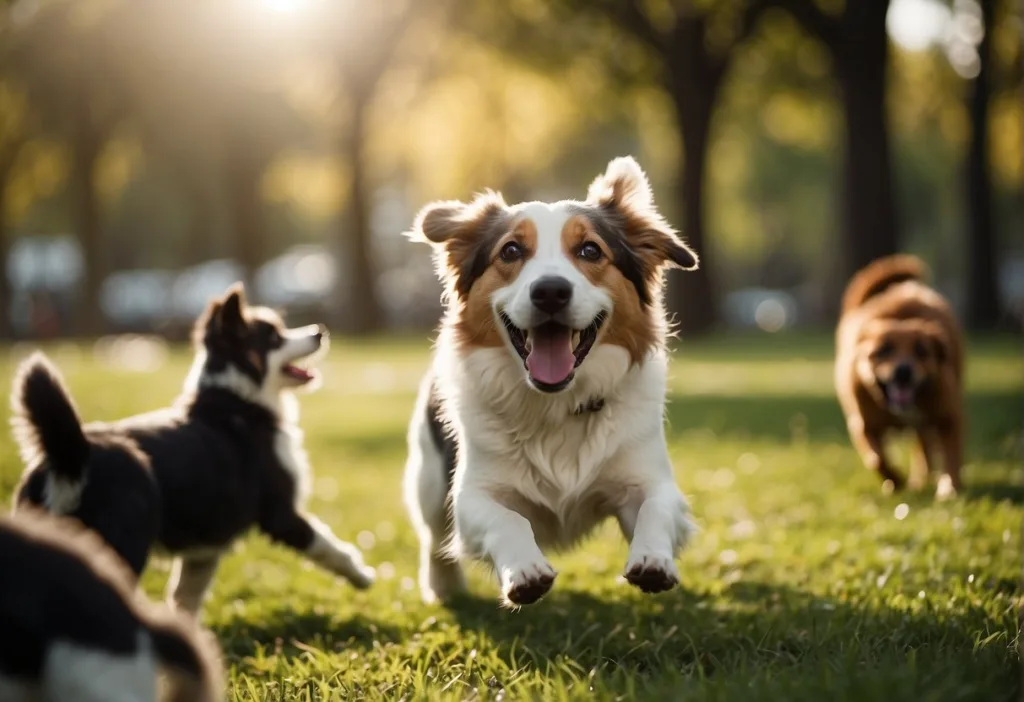
For older dogs who may have missed early socialization, all is not lost. It’s still possible to socialize adult dogs, but it may require more patience and effort. The key is to create positive experiences and to avoid overwhelming your dog. Working with a behaviorist or attending structured socialization classes can make this journey smoother. Properly socializing your dog serves to enhance their mental health, reduce fear and anxiety, and encourage a well-mannered disposition.
Through deliberate and controlled exposure to new situations and environments, your dog learns to navigate the world. This training builds up confidence and helps to mitigate issues like aggression and fearfulness, which often stem from unfamiliarity and anxiety. An effectively socialized dog is typically more engaged and interactive in a variety of settings, making time spent together more enjoyable and stress-free for both the dog and owner.
Understanding Dog Socialization
As a responsible dog owner, understanding socialization is key to raising a happy and well-adjusted pet. This section will guide you through what socialization entails, its pivotal role in your dog’s development, and the crucial period for socializing puppies.
What is Dog Socialization?
Dog socialization is the process of gradually introducing your dog to a variety of experiences, including meeting different people, and animals, and encountering various environments. This exposure helps your dog to develop a confident and stable temperament, teaching them how to behave appropriately and reducing fear-based responses to new situations.
The Role of Socialization in Development
Socialization plays a fundamental role in shaping your dog’s personality and development. Dogs that are properly socialized are often more outgoing and less stressed when confronted with new experiences. They learn to navigate new encounters positively, which is instrumental in preventing behavioral problems related to anxiety and aggression.
The Socialization Period in Puppies
The socialization period in puppies typically lasts from about three to fourteen weeks of age. During this critical window of time, your puppy is especially receptive to new experiences. Positive interactions during the socialization period can significantly influence your dog’s lifelong behaviors and reactions. Exposure to a breadth of sights, sounds, and situations is crucial during this time for building the foundation of a well-socialized dog.
Incorporating socialization into your dog’s life early and often is a fundamental part of their upbringing that enriches their life experiences and paves the way for a sociable, well-mannered adult dog.
The Impact of Socialization on Behavior
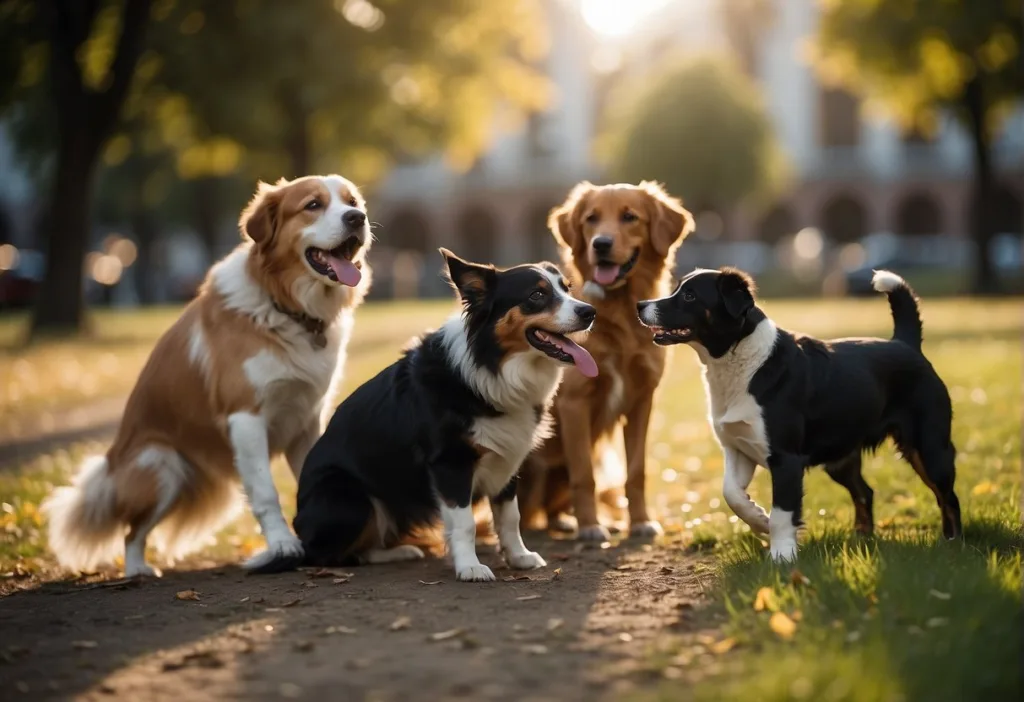
Socializing your dog plays a pivotal role in shaping their behavior, influencing how they interact with their environment, other animals, and humans. A socialization plan can significantly reduce behavioral issues, build confidence, and promote a well-adjusted temperament in your dog.
Preventing Aggression and Fearfulness
Aggression and fearfulness in dogs often stem from inadequate socialization. By exposing your dog to a variety of people, dogs, and situations from a young age, they learn to cope with stress and unfamiliarity. A dog that is comfortable in various environments is less likely to display aggressive behaviors, as they don’t feel threatened by new experiences.
- Exposure to New Stimuli: Gradual introduction to different sights, sounds, and smells can decrease fear-driven responses.
- Positive Encounters: Ensuring your dog has positive interactions with other dogs and people fosters trust and reduces the likelihood of aggressive tendencies.
Signs of a Well-Socialized Dog
You can recognize a well-socialized dog by certain signs of confidence and ease when they interact and play. These dogs:
- Approach new experiences with curiosity instead of anxiety.
- Display relaxed body language in the presence of strangers and other dogs.
- Are able to play gently and recognize cues from other animals.
A confident dog that has been well-socialized is less likely to develop stress-related behavioral issues.
Addressing Behavioral Issues
Behavioral issues can often be traced back to a lack of early socialization. However, with patience and the right strategies, you can address these issues and help your dog become more adaptable.
- Positive Reinforcement: Reward-based training reinforces good behavior without adding stress.
- Consistency: Regular exposure to social situations helps maintain and improve your dog’s social skills.
Remember, the earlier you start socializing your dog, the more effective it will be in shaping their behavior for a well-balanced life.
Socialization Techniques and Training
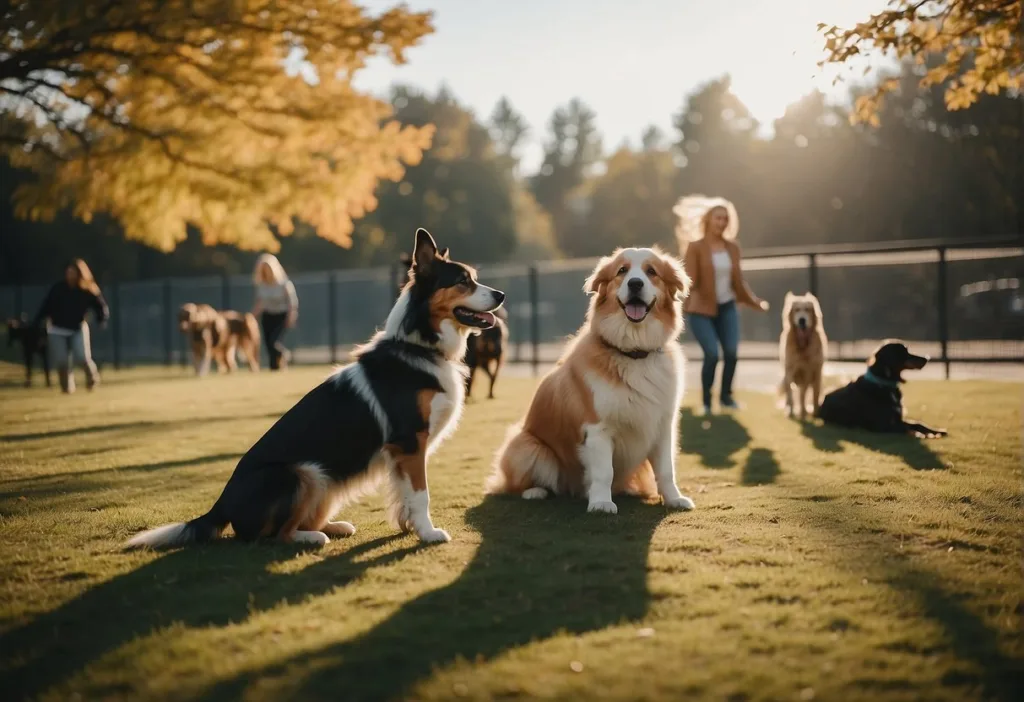
Effective socialization of your dog involves a combination of strategies centered around positive reinforcement, structured obedience training, and addressing any underlying fear and anxiety with patience.
Positive Reinforcement and Treats
Using positive reinforcement is a cornerstone of dog socialization. Rewarding your dog with treats for good behavior promotes a willingness to engage in social activities. During socialization, each positive encounter your dog has with new experiences should be paired with treats, turning these experiences into positive associations. Introducing a variety of treats can keep your dog interested and motivated.
Effective Obedience Training
Structured training classes provide a controlled environment where your dog can learn basic commands while being exposed to new dogs and people. Engaging in obedience training also reinforces good manners and appropriate social behaviors avoiding potential problematic interactions. Classes encourage discipline, aiding in easier management during social encounters.
Overcoming Fear and Anxiety with Patience
Dogs may experience fear and anxiety when faced with new or unfamiliar situations. To help your dog overcome these feelings, approach new experiences with patience. Gradual exposure, or desensitization, can reduce anxiety by slowly introducing your dog to new stimuli in a controlled, reassuring manner. It’s important to understand and recognize the signs of stress in your dog during socialization and to proceed at a pace comfortable for your dog, ensuring each step is a positive experience.
Socialization Opportunities and Activities
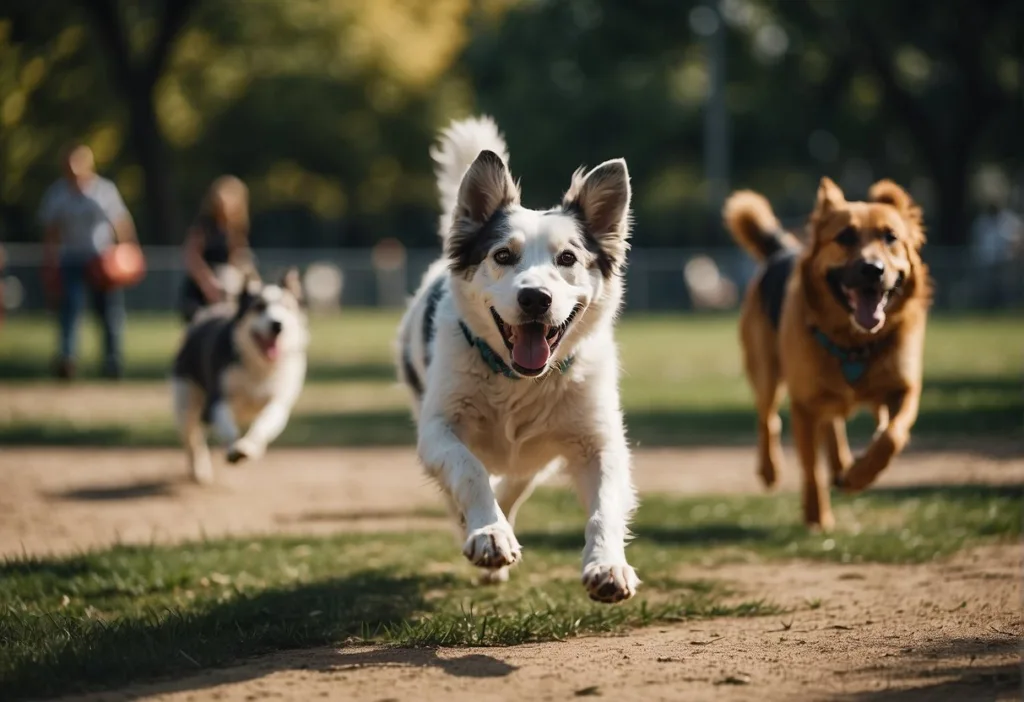
Socializing your dog plays a crucial role in their development and behavior. Through regular interaction with different settings and characters, your dog can become more confident and better adjusted to varying scenarios.
The Importance of Playdates and Dog Parks
Playdates and visits to the dog park are essential in familiarizing your pet with other dogs in a controlled and safe environment. These interactions allow your dog to develop important social skills and learn appropriate ways to communicate and play with their peers. Here are some specific opportunities:
- Organized Playdates: Set up meetings with known pets and owners.
- Dog Parks: Frequent visits can provide a diverse range of interactions with different dogs.
Creating Positive Associations with New Experiences
Introducing your dog to new experiences should be done gradually, ensuring they feel comfortable and safe. Start with short, pleasurable encounters and slowly increase exposure:
- New Environments: Take your dog to different places like beaches or forests.
- Calm Introductions: Keep initial interactions brief and positive.
Safe Interaction with People and Animals
It’s imperative to manage your dog’s interaction with different people and animals to build positive associations. This involves:
- Supervised Meetings: Always be present during new encounters.
- Variety of People: Introduce your dog to individuals of varying appearances and ages in a controlled manner.
Each activity supports your dog’s ability to adapt and thrive in a world full of constant change. The goal is always to ensure these experiences are positive and beneficial for your furry friend’s social progression.
Challenges and Considerations in Socializing Dogs
When socializing your dog, it’s key to be aware of their emotional state and understand that every dog is an individual with different needs ─ especially when dealing with older or rescue dogs. Recognizing signs of stress, knowing when to seek professional help, and applying appropriate techniques for socialization can positively impact your dog’s behavior and overall well-being.
Recognizing and Handling Overwhelm and Stress
It’s essential that you observe your dog closely for signs of anxiety or stress, such as panting, yawning, or avoidance behaviors. Should your dog exhibit signs of overwhelm during socialization, it is crucial to promptly remove them from the stressful situation. Creating a safe space and using calming techniques can help in alleviating their distress. Remember, gradual exposure to new environments and experiences, paired with positive reinforcement, can build tolerance and confidence.
Tips for Socializing Adult and Rescue Dogs
Socializing adult dogs, especially rescue dogs, may require additional patience. With rescue dogs, you must consider their past experiences and the possibility of them being reactive. Introductions to new situations should be done slowly. Begin with quiet environments to minimize the risk of overwhelming your dog and gradually introduce them to more dynamic settings. Consistent, positive experiences will help foster a sense of security.
Seeking Professional Help When Needed
At times, despite your best efforts, you might need external assistance. Don’t hesitate to seek professional help from a certified dog behaviorist or trainer such as Beyond the Leash in Orlando, particularly if your dog’s reactions seem extreme or unmanageable. A professional can offer tailored strategies and support for dealing with anxious or reactive dogs. Their expertise can be invaluable in helping your dog become well-socialized, especially for more challenging cases.

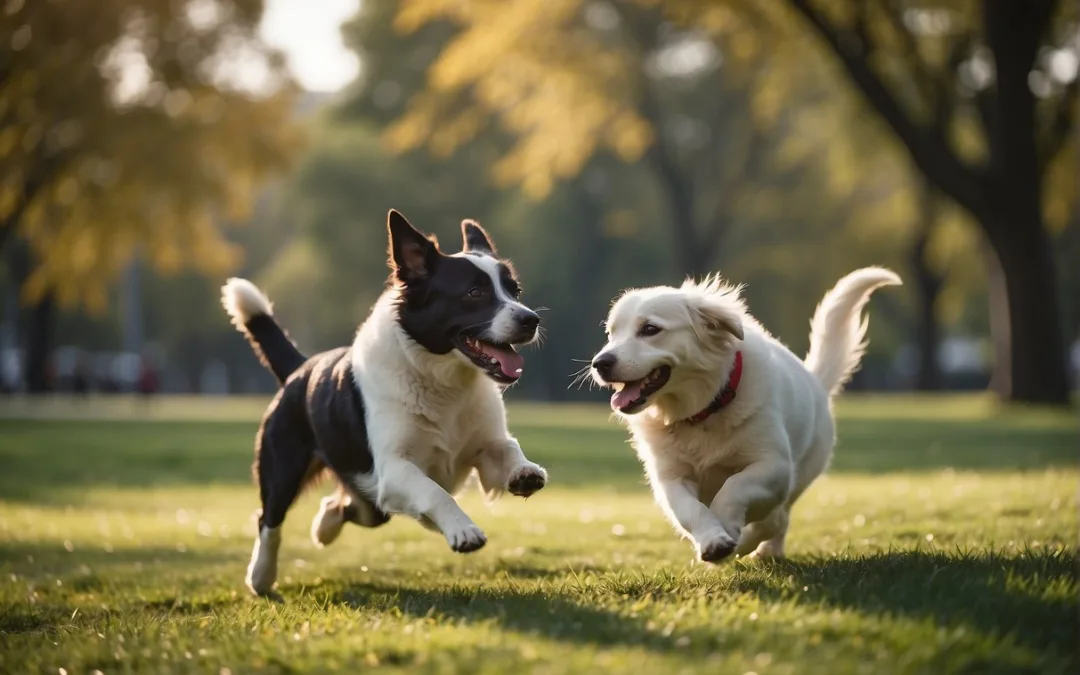
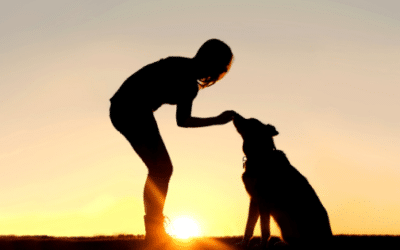
Recent Comments